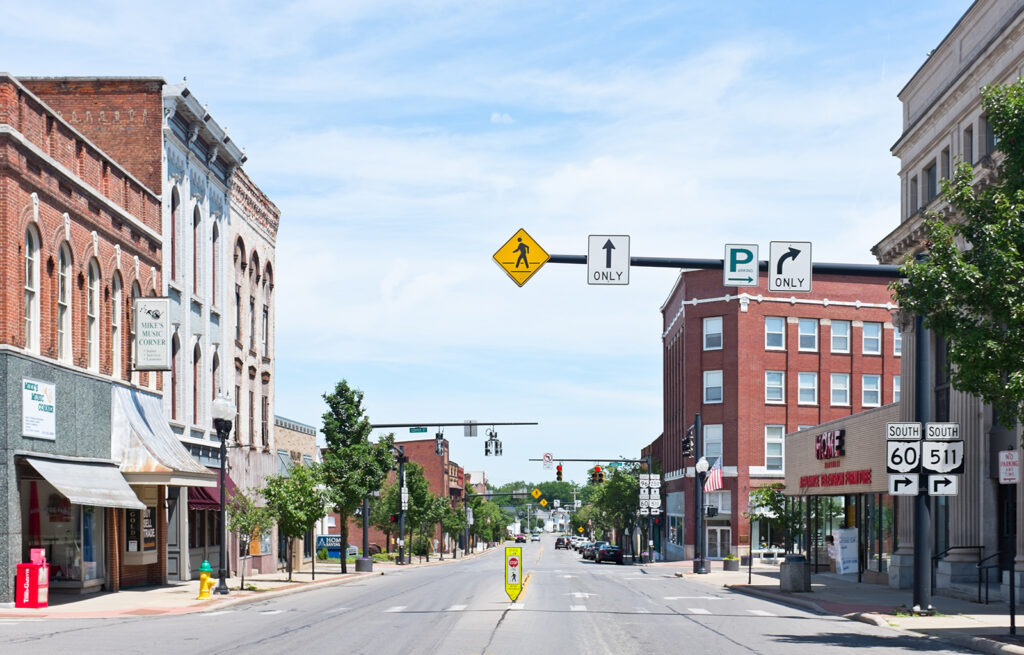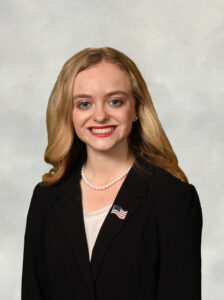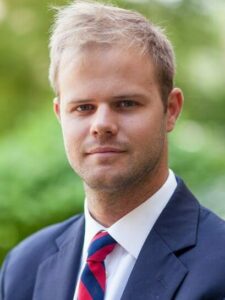Covid in our Community: A Study of the Pandemic’s Effects on Local Businesses and Government
July 26, 2021

The global COVID-19 pandemic presented an intriguing, and hopefully, once-in-a-lifetime opportunity for Ashbrook’s Political Economy students. Realizing that they were living in the midst of history, two Ashbrook Scholars, Micaela Coon and Carolina Amparo, took it upon themselves to study the effects of the pandemic on the local economy in Ashland, Ohio, the home of the Ashbrook Center and Ashland University. Advised by Dr. Robert Wyllie, the Director of the Political Economy Program, they produced the following report.
Panic at airports; falling stock markets; toilet paper shortages; lockdowns and later mask mandates. Stuck at home except for fearful trips to the grocery store, many Americans retreated into their “pods,” following the pandemic news from a national perspective on cable news or the Internet. We seem to know little about how COVID-19 has affected our neighbors, their businesses, and our local governments, even if we have absorbed vast amounts of information about the virus, the vaccine, and how these have changed the United States and the world. Wondering about how COVID-19 impacted small businesses and local governments, and realizing that no economics textbook or political science professor could explain what happens when a global pandemic strikes a highly integrated global economy, we remembered we could still speak to individuals face-to-face and ask. As soon as it was safe to do so this spring, we interviewed business owners and local officials here in Ashland, Ohio.
We found many community members were more than eager to speak with us. We are political economy students at Ashland University, a liberal arts college in a town of roughly 20,000 people between Cleveland and Columbus. Ashland is a rural and “very conservative” town, the Republican mayor, Matt Miller, assured us. We are also Ashbrook Scholars who have come to Ashland to study history and political science by focusing on primary sources. In the case of the COVID-19 pandemic, however, these sources do not exist yet. It falls to us to begin to record the voices of those who have led their local organizations and businesses through the pandemic. Many of those we talked to simply wanted their neighbors in Ashland to be more aware of the struggles they faced keeping their doors open and lending a helping hand during the pandemic. These are their stories.
Ashland was mostly untouched by the pandemic in its earliest days, when cases spiked in New York City in late March, and remained largely unfazed. Mayor Miller told us that calls from fearful local citizens only began to pour in once the virus began to spread throughout the state in September and October. He was not the only one with an unexpected leadership test. Everyone we interviewed was tested by the pandemic. Many of them were worried that, at some point in the spring and summer of last year, they would never again return to the business that they had spent years of their lives building. Most of them told us that deciding when and how to open their businesses was the most politicized decision they had ever made. Suddenly even a custom children’s clothing boutique with little dresses on a rack outside and a brightly colored make-your-own frozen yoghurt dessert shop became the scenes of political altercations, standoffs, and complaints. Although the business owners we surveyed came from a variety of venues, one theme kept recurring: never has running a business been as politicized as it was during the fearful and uncertain summer of 2020.
An Ashland and Ashbrook alumnus, Mayor Miller generously agreed to speak to us about the pandemic, and our promised fifteen-minute interview ran almost an hour. He welcomed us into his wood-paneled office complete with a replica of the Statue of Liberty, historical paintings, and stately furniture. Mayor Miller reflected upon a discrepancy in the early days of the pandemic, when case numbers and fears in Ashland County were low, but national and even local media were sounding the alarm. The county was preparing for the worst-case scenario. Before Ashland recorded its first positive COVID-19 case, he said, the county emergency management team publicly mentioned a contingency plan to bring in refrigerator trucks for corpses in case the morgue was overwhelmed. Mayor Miller was at least equally concerned about spreading fear and panic. Frustrated by what he believed were premature and in some cases overly strict state-level mandates, Mayor Miller made it a priority to help businesses remain open while still complying with state and federal COVID-19 regulations. He pointed to the fact that Ashland County had the state’s lowest unemployment rate in early August as a sign of his success. When our time with him ended, Mayor Miller summed up his philosophy with regard to the pandemic: “better to err on the side of freedom.”
Mayor Miller was not the only person concerned with state mandates, but for Nancy Pauly, who owns the frozen-yoghurt shop Eva’s Treats, the main issue was uncertainty. Mixed messages and lack of awareness about state mask mandates created painful encounters with her staff. Ms. Pauly told us how customers berated her employees for not wearing masks before the state mask mandate went into effect in late June. She had worked hard to install plexiglass barriers and reconfigure her serve-your-own shop for the safety of her customers and employees, but realized there was no agreed-upon “middle ground” that summer. Ms. Pauly required her employees to wear masks before the state mandates went into effect; still, she was nonplussed that the local newspapers began covering how businesses were opening, including whether their employees were required to wear face coverings. A trip for frozen yoghurt on a summer night, unexpectedly, would bring you to the front lines of the national controversy over business reopening.
Ms. Pauly’s concern that local media reporting discouraged business and politicized her store was familiar to us. The very first person we interviewed, Megan Steffen of Whoopsie Daisy Bowtique, complained that the paper reported on how many citizens were wearing masks while patronizing Main Street storefronts like hers. The national controversy over facemasks found a local echo. Moreover, the local paper, the Ashland Times-Gazette, and the local news website the Ashland Source—the mainstream media—were critiqued for their political slant. The parallels to national politics extend further. For his part, Mayor Miller teamed up with an ex-Ashland police officer and Army veteran with a large Facebook following to get local information out via social media, a technique that is becoming increasingly common in local and national politics alike.
Some business owners were surprisingly supportive of regulations and mandates once they were clear and widely communicated. At first, large retailers like Wal-Mart were allowed to remain open as “essential” businesses because they sold groceries, which their smaller competitors universally regarded as highly unfair. Once the regulations for shopping became clear and applied evenly, Ms. Pauly and Ms. Steffan suggested, mandates about masks and occupancy requirements seemed to encourage more Ashland customers to return to dining and shopping in-person. Uncertainty regarding regulations and inspection requirements for reopening food services, however, were particularly confusing, Ms. Pauly complained. Those business owners whom we spoke with in March were especially optimistic about the vaccine rollout to bring business back to normal, but none said they would make vaccines mandatory for their employees.
Not all businesses were equally well suited to adapt to the new local economy required by the pandemic and health regulations. Allan Andersen counted himself lucky to have started a software development business. Even if demand for remote programming work decreased during the summer, he reflected that the pandemic demonstrated the stability and independence of a career in computer technology. Ms. Steffan expanded her Etsy storefront that she had developed before moving into her boutique in order to make up the shortfall in demand. Julianna Hritz’s Vines Bakery actually sold more baked goods during the pandemic as a result of offering curbside pick up and special pre-order boxes that the community supported. Additionally, other businesses that offer edible goods were able to continue to do business thanks to apps like Grubhub and Doordash, but Ms. Pauly glumly stated the obvious: frozen yoghurt doesn’t ship well. Given the uncertainty and hardship all small businesses faced, the City of Ashland disbursed some of its $1.5 million CARES Act funds in $5,000 emergency loans and partial grants. (Other funds went to new cars and trucks for municipal departments, filling a long-term need on the hopefully short-term pretext that fewer city employees per vehicle would prevent the spread of the virus.) Mayor Miller was proud to have made this assistance easy to apply for, so that forty-two businesses—well over the projected thirty—received them, including many of the business owners whom we spoke to. He was also proud of the larger local businesses that passed up relief checks, and spoke glowingly about how generous Ashland citizens have been to local charities, historically and especially during the pandemic.
We quickly learned that the business owners whom we spoke with were not only concerned with their businesses, but are active volunteers in non-profits and charities with a wider perspective. Ms. Hritz and Mr. Andersen are members of the Ashland Chamber of Commerce and active supporters of Ashland University. In addition to running her boutique, Ms. Steffen is a member of the downtown revitalization board, on school board, and vice-president of the Ashland Historical Society. She was one of the first people in Ashland to make and sell masks, when they were in very short supply. Ms. Pauly spoke not only from her experience as the owner of a frozen yoghurt store, but also as a longtime volunteer member of the county emergency management team. She continues as a volunteer to help administer the vaccine rollout. Ms. Pauly and her son, Aaron Pauly, who coordinates Ashland Area Economic Development, came to address our Ashland Center for Civic Life roundtable discussion on reopening the economy. This forum brought Ashland citizens and AU students together to broaden the discussion we have been having with local community members.
The impact of COVID-19 on the world, and on our town, is still being assessed. Our in-depth discussions with community leaders in Ashland, however, put a human face on the effects of the pandemic. We hope their perspectives and their perseverance will help others think about what real people have gone through to bring communities through the pandemic.
by Micaela Coon and Carolina Amparo, Ashbrook Scholars. Advised by Dr. Robert Wyllie, Director of the Political Economy Program.




